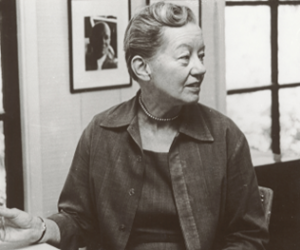
Women’s History Month – Petra Celebrates Women’s Impact on Affordable Housing
Every March we recognize Women’s History Month by honoring the contributions that women have made to American history, society, and culture. This month at Petra we’d like to highlight two such women who have helped shape the development of affordable housing policies in the United States, and whose impact is still felt today.
 Catherine Bauer Wurster (1905-1964) was a pioneer in the world of public housing in the United States. With a background in architecture and city planning, she became an early advocate and educator on housing issues. She was recognized as one of the lead “housers” – a group of planners who advocated affordable housing for low-income families – and her work helped dramatically change housing practices and laws across the country.
Catherine Bauer Wurster (1905-1964) was a pioneer in the world of public housing in the United States. With a background in architecture and city planning, she became an early advocate and educator on housing issues. She was recognized as one of the lead “housers” – a group of planners who advocated affordable housing for low-income families – and her work helped dramatically change housing practices and laws across the country.
Catherine was a trailblazing woman, who literally penned the book on affordable housing in the U.S. in her 1934 publication Modern Housing. During that same year, she was named executive director of the New Labor Housing Conference by the American Federation of Labor.
Catherine was the primary author of the U.S. Housing Act of 1937, which revolutionized American housing by providing affordable, subsidized residences for low-income citizens for the first time in history. This authorship laid the groundwork for what has essentially become the model for all U.S. affordable housing policies.
Over the course of her career, Catherine served and advised presidents Roosevelt, Truman, and Eisenhower on housing and urban planning strategies, and was appointed Director of Information and Research for the newly formed United States Housing Authority in 1937. Throughout the 1930s – 1960s, she worked in advisory roles for a variety of national, state, and local housing and planning agencies, including the Federal Housing Administration, the Housing and Home Finance Agency, and the California Housing and Planning Association. Her ideas on housing were also instrumental in the creation of the influential documentary film The City, which was produced for the 1939 New York World’s Fair.
Catherine’s legacy lives on in the extensive policy work put forth throughout her political advising career, much of which serves as the basis of today’s policies. Countless families still benefit from the affordable housing that she created in her lifetime, while Modern Housing and her prolific scholarship will continue to inspire future social housing advocates for decades to come.
 Patricia Roberts Harris (1924-1985) was an American politician, diplomat, and legal scholar who was active in the fields of civil rights, public service, and social justice. She served as the 6th United States Secretary of Housing and Urban Development (HUD) from 1977 to 1979, making her the first African American woman to hold a cabinet position. She also served as the 13th United States Secretary of Health and Human Services (HHS) from 1979 to 1981 under President Jimmy Carter.
Patricia Roberts Harris (1924-1985) was an American politician, diplomat, and legal scholar who was active in the fields of civil rights, public service, and social justice. She served as the 6th United States Secretary of Housing and Urban Development (HUD) from 1977 to 1979, making her the first African American woman to hold a cabinet position. She also served as the 13th United States Secretary of Health and Human Services (HHS) from 1979 to 1981 under President Jimmy Carter.
In her role as HUD Secretary, she had the opportunity to reorganize the department, shifting its focus – and millions of dollars of funding – from simply knocking down slums to upgrading and rehabilitating those dilapidated neighborhoods.
She established a Neighborhood Strategy Program that subsidized the renovation of apartments in deteriorated areas. Harris was instrumental in the rapid implementation and deployment of the Urban Development Action Grant (UDAG), a program designed to help bring businesses back into the blighted areas of many cities. She also expanded the existing Urban Homesteading Plan to utilize existing housing stock in select neighborhoods and helped preserve and revitalize the community through providing homeownership.
During Harris’ tenure, HUD awarded nearly 400 action grants to 320 cities, driving private investment in downtown commercial ventures such as Baltimore’s Harborplace and increased improvements in many other neighborhoods. Harris leveraged her role at HUD to divert additional funds to helping urban areas, particularly older and poorer cities. She also issued rules that encouraged communities to spend three quarters of their development money on sewers, parks, community centers, and other projects that would benefit inner-city residents.
Harris was truly a woman passionate about her commitment to using her role to make a difference in the lives of so many. Looking back at her reforms several years after the fact, the Washington Post noted: “Subsidized housing starts quadrupled during her tenure, and private investors were prodded into developing ravished cities with an innovative action-grant program. After two years as secretary, the agency had changed from a mere extension of the nation’s housing industry to an advocate for saving inner cities.”
Petra is both motivated and inspired by the lives and works of these two women. We are proud to celebrate the critical and long-lasting impact they have had on the sustainability of affordable housing, including the funding and support for ongoing development that continues to this day.

